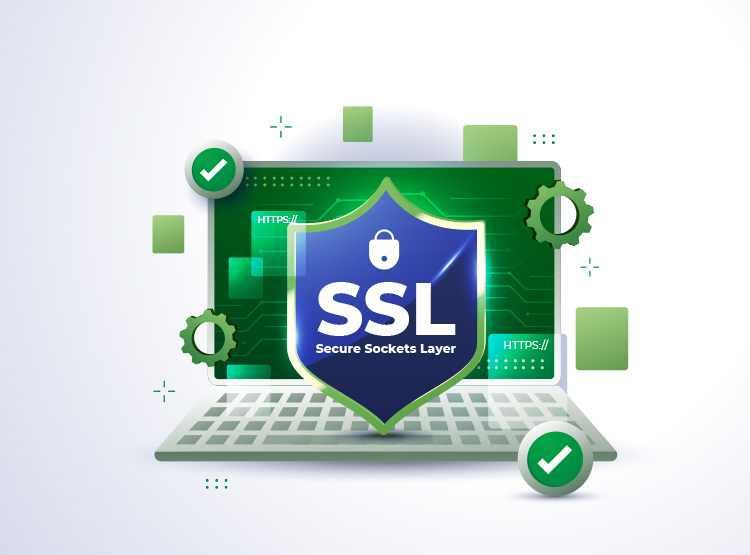The public key, the issuer of the certificate, and the associated subdomains are all displayed on an SSL certificate for validating the owner of a website and encrypting online traffic with SSL/TLS.
An SSL certificate is a digital certificate that verifies the identity of a website and allows for a secure connection. Secure Sockets Layer (SSL) is a security protocol that establishes an encrypted connection between a web server and a web browser.

SSL certificates must be installed on a company's or organization's website in order to safeguard online transactions and keep customer information private and secure.
In a nutshell, SSL protects internet connections by preventing thieves from reading or altering data sent between two systems. SSL safeguards the website you're visiting if you see a padlock icon next to the URL in the address bar.

SSL certificates are required for websites in order to protect user data, validate website ownership, prevent attackers from creating a false version of the site, and transmit trust to users.
It is critical to keep data secret if a website asks users to sign in, submit personal information such as credit card numbers, or read confidential information such as health benefits or financial information. SSL certificates help to keep online interactions private by assuring consumers that the website they are visiting is legitimate and safe to exchange personal information with.
The fact that an SSL certificate is necessary for an HTTPS web address is more significant to enterprises. HTTPS is the secure version of HTTP, which means that HTTPS websites use SSL to encrypt their traffic. HTTP sites — those without SSL certificates – are typically labeled as "not secure" by most browsers. This sends a clear signal to visitors that the site isn't trustworthy, motivating businesses that haven't switched to HTTPS to do so.
SSL/TLS encryption is possible because SSL certificates allow for the matching of public and private keys. The public key required to open a TLS connection is obtained by clients (such as web browsers) from the SSL certificate of the server.
Authentication: SSL certificates ensure that a client is communicating with the correct domain owner's server. This aids in the prevention of domain spoofing and other types of cyber-attacks.
HTTPS: An SSL certificate is required
for an HTTPS web address, which is especially important for enterprises. HTTPS is the secure version of HTTP, and HTTPS websites are those that use SSL/TLS to encrypt their traffic.
These certificates do not have a price tag connected to them, as the name implies. The goal of making an SSL certificate ...
It is necessary to pay to get these certificates installed on a website. A trusted certificate authority issues and signs a paid...
Only Domain Validation (DV) is available with free SSL certificates. Only the most basic degree of authentication is provided by DV ...
CA does not validate anything other than the identification of the website owner when it comes to confirming a website owner's ...
Popular CAs provide free SSL certificates that are valid for 30-90 days. As a result, the certificate must be renewed every...
These certificates do not have a price tag connected to them, as the name implies. The goal of making an SSL certificate available for free was to ensure that all websites could use HTTPS.
There are two types of free SSL certificates.
Self-Signed Certificates are those that do not require the signature of a Certificate Authority. They are personally signed by the issuer. The second form of free SSL certificate accessible on the market, on the other hand, is signed
by a Certificate Authority (CA). In terms of encryption, a free SSL certificate offers the same level of protection as a purchased SSL certificate.
It is necessary to pay to get these certificates installed on a website. A trusted certificate authority issues and signs a paid certificate (CA). You can buy it directly from the Certificate Authority's website or from third-party businesses known as "Resellers." In terms of encryption, a free SSL certificate offers the same level of protection as a paid certificate. ‘Why should I pay for the same certificate when you can acquire it for free?' you might be thinking.
Only Domain Validation (DV) is available with free SSL certificates. Only the most basic degree of authentication is provided by DV certificates. They're typically utilised for platforms like small web pages and blogs. Organization Validation (OV) and Extended Validation (EV) certificates are not available with free SSL certificates. The purchased SSL certificates, on the other hand, include OV and EV alternatives, which are essential for protecting commercial websites.
CA does not validate anything other than the identification of the website owner when it comes to confirming a website owner's business details before providing a free certificate. While in the case of purchased SSL certificates, verification of the website owner's identification is required before granting the certificate, the certificate authority performs in-depth verification of the business in the case of OV & EV certificates (CA).
Popular CAs provide free SSL certificates that are valid for 30-90 days. As a result, the certificate must be renewed every 30-90 days by the website owner. Certificates that have been paid for can be granted for a duration of 1-2 years.
Installing an SSL/TLS Certificate on a website ensures that data transferred between a visitor and a website, as well as vice versa, is secure. Though it should be emphasised that this does not imply that the information on the server is secure, as once sensitive data reaches the server, it is up to the administrator to determine how to keep it safe, such as database encryption. In other words, HTTPS means that HTTP is sent via an SSL-encrypted connection, which includes GET and POST, as well as other HTTP actions, while keeping the data safe and unchanged because all data is sent to the client browser via an SSL tunnel.